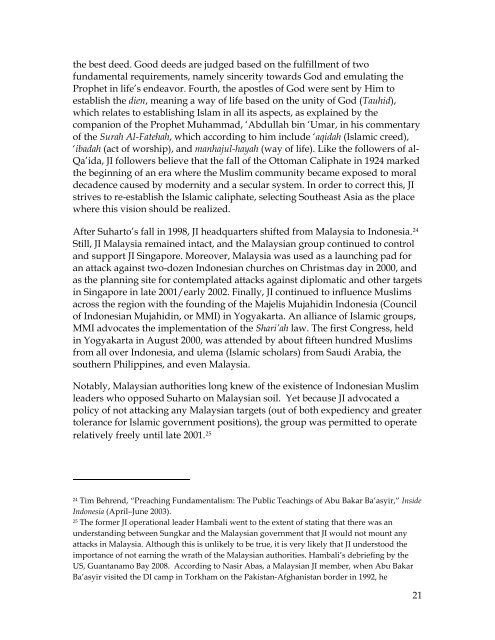You also want an ePaper? Increase the reach of your titles
YUMPU automatically turns print PDFs into web optimized ePapers that Google loves.
the best deed. Good deeds are judged based on the fulfillment of two<br />
fundamental requirements, namely sincerity towards God and emulating the<br />
Prophet in life’s endeavor. Fourth, the apostles of God were sent by Him to<br />
establish the dien, meaning a way of life based on the unity of God (Tauhid),<br />
which relates to establishing Islam in all its aspects, as explained by the<br />
companion of the Prophet Muhammad, ‘Abdullah bin ‘Umar, in his commentary<br />
of the Surah Al-Fatehah, which according to him include ‘aqidah (Islamic creed),<br />
‘ibadah (act of worship), and manhajul-hayah (way of life). Like the followers of al-<br />
Qa’ida, JI followers believe that the fall of the Ottoman Caliphate in 1924 marked<br />
the beginning of an era where the Muslim community became exposed to moral<br />
decadence caused by modernity and a secular system. In order to correct this, JI<br />
strives to re-establish the Islamic caliphate, selecting Southeast Asia as the place<br />
where this vision should be realized.<br />
After Suharto’s fall in 1998, JI headquarters shifted from Malaysia to Indonesia. 24<br />
Still, JI Malaysia remained intact, and the Malaysian group continued to control<br />
and support JI Singapore. Moreover, Malaysia was used as a launching pad for<br />
an attack against two-dozen Indonesian churches on Christmas day in 2000, and<br />
as the planning site for contemplated attacks against diplomatic and other targets<br />
in Singapore in late 2001/early 2002. Finally, JI continued to influence Muslims<br />
across the region with the founding of the Majelis Mujahidin Indonesia (Council<br />
of Indonesian Mujahidin, or MMI) in Yogyakarta. An alliance of Islamic groups,<br />
MMI advocates the implementation of the Shari’ah law. The first Congress, held<br />
in Yogyakarta in August 2000, was attended by about fifteen hundred Muslims<br />
from all over Indonesia, and ulema (Islamic scholars) from Saudi Arabia, the<br />
southern Philippines, and even Malaysia.<br />
Notably, Malaysian authorities long knew of the existence of Indonesian Muslim<br />
leaders who opposed Suharto on Malaysian soil. Yet because JI advocated a<br />
policy of not attacking any Malaysian targets (out of both expediency and greater<br />
tolerance for Islamic government positions), the group was permitted to operate<br />
25<br />
relatively freely until late 2001.<br />
24<br />
Tim Behrend, “Preaching Fundamentalism: The Public Teachings of Abu Bakar Ba’asyir,” Inside<br />
Indonesia (April–June 2003).<br />
25<br />
The former JI operational leader Hambali went to the extent of stating that there was an<br />
understanding between Sungkar and the Malaysian government that JI would not mount any<br />
attacks in Malaysia. Although this is unlikely to be true, it is very likely that JI understood the<br />
importance of not earning the wrath of the Malaysian authorities. Hambali’s debriefing by the<br />
US, Guantanamo Bay 2008. According to Nasir Abas, a Malaysian JI member, when Abu Bakar<br />
Ba’asyir visited the DI camp in Torkham on the Pakistan-Afghanistan border in 1992, he<br />
21


